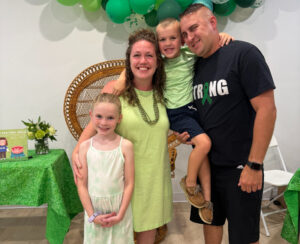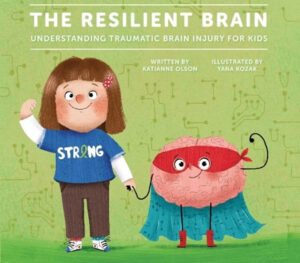By Katianne Olson
“Daddy fell and hit his head pretty bad and won’t be home for a little bit. He’s at the hospital, but he’s strong and fighting really hard to get better.”
Those were the first words I said to my almost 4-year-old daughter Piper the day after learning about my husband Chase’s traumatic brain injury (TBI). It was the dreaded conversation I knew needed to happen sooner rather than later. Our two children, Piper and Caden, were used to my husband’s shift schedule since he’s a firefighter, but this was going to be longer than just the 48-hour overtime shift he occasionally worked. Though first responder kids have a strength of their own when it comes to being flexible, this was going to be a whole new ballgame.
I sat in her bedroom, staring at her big blue eyes and curly blonde hair, wondering if this was just a horrible nightmare. I quickly realized this wasn’t something I was going to wake up from. It was the reality I was facing.
“Is he ok? When will he be home?” she asked.
I went numb. I tried to speak … but nothing came out. I took a deep breath as my mind went racing. How do I tell her I’m not sure? How much do I tell her? How do I tell Caden (who was almost one year old at the time) that the “Da-Da-DADA” he’s been gabbing about all morning is fighting for his life?”
I took a quick pause and decided regardless of how young my children were, I was going to be transparent with them. Did I nail that conversation? Far from it. Did I question myself? 1000%. My hope was simply to instill the courage and bravery we were going to need to help the person we love the most navigate a TBI. That means I had to start with the truth – regardless of how much uncertainty it brought.

(Caden, left, 11 months and Piper, right, almost 4)
After that emotional conversation, I googled every variation of “how to explain a brain injury to young kids,” browsed my local library, searched endlessly on Amazon—only to be left frustrated and angry. I kept hitting dead ends. As a special education teacher who is passionate about inclusion and disability awareness, I thought, “How is there nothing out there on brain injuries for children?”
It was during that very hard conversation the concept of The Resilient Brain: Understanding Traumatic Brain Injury for Kids was created in my heart.
We‘re all at risk of experiencing a concussion or TBI and at some point in our life, if not personally, we will most likely know someone impacted by a brain injury. It can be the wrong fall, hit during a sporting event, car accident, or just freak accident. That is our story. The freak accident you never thought would happen to you.
Over the years, there have been many positive improvements: identifying brain injuries, cutting edge rehabilitation facilities, technological advancements, implementing safe return to play guidelines, destigmatizing the mantra of “toughin’ it up,” promoting helmet wearing, among others. The next step: how do we educate and build awareness to be used as empowerment?
One of my favorite quotes is from Maya Angelou who said, “Do the best you can until you know better. Then when you know better, do better.”
We shouldn’t wait until our brain is injured to see how remarkable it is. I’ll be honest and say I was in that category. It wasn’t until navigating my husband’s brain injury that I realized I took my own brain for granted and the incredible power it has given me to experience a life well-lived.
In reflecting now almost five years later, I learned quickly how many people face the very same challenges as our family. Our story is just one out of 2.8 million affected by TBI every year. There is nothing mild about brain injury. The long-term impacts, side effects, and overall havoc it can wreak on one’s life and their loved ones can be debilitating. The invisible nature of it all adds another layer of complication. That alone is another reason why awareness and education about brain injuries are so vital.
“When you know better, do better.”
That’s my hope for The Resilient Brain: Understanding Traumatic Brain Injury for Kids. I want it to not only be a guide for those dealing with the effects of TBI but also an educational resource. Though it’s a children’s book, the content is geared for all of us – no matter what age.
It is long overdue to give this invisible injury representation and visibility in this world, and that starts with our youngest of readers. A brain injury diagnosis can be dark and scary, but I hope audiences can read The Resilient Brain and understand that not only is the brain resilient, you are resilient as a person, no matter where you are at in your TBI journey.
I’m incredibly honored to bring this message to the world, but this time, with the words to say.
______________________________________________________________________
Katianne (Katie-Anne) Olson is a special education teacher and author of The Resilient Brain: Understanding Traumatic Brain Injury for Kids. She lives in Chicago with her husband and two children.
To learn more about Katianne, visit her website and follow her on Instagram.


